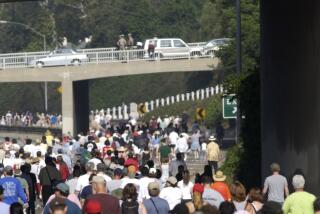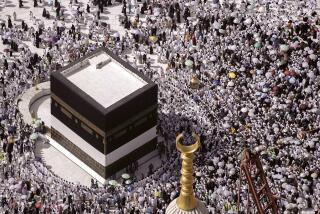Conservative, Cosmopolitan Societies Will Link : Many Fear Impact When New Saudi-Bahrain Causeway Opens
- Share via
MANAMA, Bahrain — Construction work ended months ago, but only a few cars now use the 16-mile causeway that stretches like a ribbon of white through the turquoise waters between the island nation of Bahrain and the Saudi Arabian mainland.
Officially, the delay is due to the construction of customs and immigration buildings at the halfway point on the causeway, said to have cost more than $10,000 a foot to build, and the completion of access roads in both countries. The opening is now scheduled for the end of the year, officials say.
But there is still an atmosphere of uncertainty about opening a highway that will, in essence, end Saudi Arabia’s self-imposed isolation from the outside world. Taxi drivers in Saudi Arabia’s eastern province say with conviction that they believe the roadway will never be opened to passenger cars.
In Saudi Arabia, alcohol is forbidden by Islamic law, and society is so conservative that women may not drive a car or use a bank where men work. Bahrain, in contrast, is one of the most cosmopolitan countries in the Persian Gulf region, with few restrictions.
Many of Bahrain’s small merchants also are fearful of the impact of the causeway on their business as cheap goods from Saudi Arabia flood into Bahrain, where prices are now generally 20% higher.
“Some traders will lose, but others will benefit,” Tarik Moayyid, Bahrain’s affable minister of information, said. “Traders will just have to adjust to the new circumstances.”
Bahraini officials believe that the causeway will provide a needed shot in the arm to the island’s economy now that oil reserves are dwindling. Some rosy estimates expect as many as 15,000 visitors a day across the causeway by 1990.
Bahrain has long been disdained--and enjoyed--as a Gomorrah by Saudis living across the water in Dhahran and other cities in Saudi Arabia’s eastern province.
Saudi Arabia paid the entire $900 million cost of the causeway, and some diplomats believe that the Saudis may try to exert pressure on the Bahrainis over the road’s usage and perhaps even to limit the availability of alcohol on the island. But Bahraini officials insist that the opening of the causeway will not be allowed to transform Bahrain’s cosmopolitan atmosphere.
“If a visitor is a Muslim and doesn’t want to come to a place where people can drink, then it’s his privilege not to come,” said Ibrahim Khalifa, Bahrain’s coordinator for the Causeway Commission with Saudi Arabia. “Saudis have been coming here every day for a long time, and it hasn’t changed anything here or in Saudi Arabia.”
Saudis Flock to Bahrain
Indeed, Saudis throng the half-dozen daily Gulf Air flights, which at 19,700 Bahrain dinars, or $71.90 for the 16-mile one-way trip, rank among the most expensive airline flights in the world. The flight is so short that the no-smoking sign is turned on again one minute after takeoff.
Officials expect Gulf Air’s business to decline substantially after the causeway is open to general traffic. Not including customs formalities, it is a 20-minute drive across the water.
“You should see our passengers returning home to Saudi Arabia after a weekend in Bahrain,” a Gulf Air official said. “Many of these guys have to be carried onto the plane, they’re so snozzled (with drink). Can you imagine them all driving their own cars home? It will be a slaughter.”
Also expected to be affected is the historic trade by dhow, the graceful wooden boats with high arched sterns that have been crossing the Persian Gulf for centuries.
“I don’t know what any of us will do when the causeway opens,” said Darvish Salem, captain of the 120-ton Stiklal, who was barefoot and stripped to the waist as he greeted a visitor. “My family will be in the hands of Allah,” he said wistfully.
There are about 55 dhows carrying cargo and passengers back and forth to Dhahran on the Saudi coast, and officials believe that most, if not all, will be put out of business by the causeway.
The fear among Bahraini merchants is twofold: that by enjoying quantity discounts for the large Saudi market, Saudi importers will be able to undercut Bahrain’s price structure. Secondly, that Bahrainis will merely travel across the causeway to do their shopping if the process is as convenient as officials predict.
“In the long term, we expect prices between Saudi Arabia and Bahrain to equalize,” said Hassan Zainal Abideen, a Bahraini investment banker. “There are meetings going on to improve cooperation between businessmen in the two countries when the causeway opens. At first there may be competitive unhappiness, but it will shake out in the end.”
MP, Los Angeles Times
More to Read
Sign up for Essential California
The most important California stories and recommendations in your inbox every morning.
You may occasionally receive promotional content from the Los Angeles Times.










